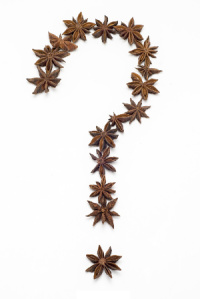
Frequently Asked Spice and Herb Questions

With nearly three decades in the spice business (I can’t believe I’m that old!), I’ve heard a lot of the same spice and herb questions over and over again. Here you’ll find answers to some of those common questions. If you have a inquiries of your own, feel free to ask it in the comment section below or by sending me a message.
What exactly is a spice?
Here is the Food and Drug Administration general definition of a spice:
SPICES – General Definition – Aromatic vegetable substances, in the whole, broken, or ground form, whose significant function in food is seasoning rather than nutrition. They are true to name and from them no portion of any volatile oil or other flavoring principle has been removed.
Unlike herbs which are the leafy portion of aromatic plants, spices are derived from the seeds, roots, berries and barks of plants. Spices most often originate from tropical regions and are nearly always harvested by hand.
When would you use whole spice vs ground spice?
Buy whole spices as often as possible. USE freshly ground spices. They taste better when freshly ground by mortar and pestle.
Do you recommend a particular spice grinder?
When a mortar and pestle isn’t convenient, I recommend the Waring Commercial Spice Grinder. I have two! The bowl is small enough to do preparations for one meal. The cost is serious but so is the quality of the blender. (Price has come down to less than 1/2 of what it was when it came out.)
Why do spices sometimes cost so much?
There are so many variables. You have to consider the crop year, the age of the product, the climate of the growing region and the source.
Do spices have an expiration date?
Yes. They should be used within a year. Keep in mind that spices don’t go bad, but they do lose color and flavor. Heat, light and moisture are the enemy of spices. Except for fresh herbs don’t keep spices in the refrigerator. You may freeze them, but it is not required.
What should I do with old spices?
Well, you should cook with them before it’s too late! But if that doesn’t happen, many people use their old spices to make homemade candles, soaps and air fresheners. I’ve even heard some people use sage, pepper and oregano as a bug deterrent.
Is there a way to buy local, in-season spices?
It’s great to buy local for herbs and micro-greens, but buying local is not always possible for spices.
Is there ever a reason to freeze spices?
If you want to preserve the flavor, then yes you can store spices by freezing them. But, this could change the texture of your spices due to condensation and temperature changes.
Best way to store spices and herbs?
Just like the label says, store your spices in a cool, dry place. I’ll also add that spices should be kept in a cabinet or in dark containers away from your stove/oven. If you’re buying fresh herbs, herbs stored in a glass with an inch of water in the bottom of the glass and then refrigerated will extend the herb’s life – WHICH, should be short! Use them quickly!
What is the best way to dry fresh herbs and keep the oils and flavor?
The old traditional way is the best. Tie them in bunches and hang in your kitchen. Or, hang them in a garden room, or mud room or other suitable shelter. Ideally, you want to protect them from heat, light and moisture.
How long will a spice last if you toast it and then store it?
If you toast something, the shelf life is cut down by a fourth. In other words, toasted spices see a 2-3 month shelf life.
How do you prevent spices from clumping?
An air tight container should be all you need. Spice blends, especially those with sugar and salt will agglomerate – especially in hot and humid climates. Many spice manufacturers use Silicon Dioxide as an anti-caking agent. I don’t. I do sometimes use Rice Concentrate to prevent the clumping in all-natural seasoning blends. The Rice Starch grabs moisture before the sugar or honey powder and thus helps prevent caking.
What is the most common mistake people make when cooking with spice?
Don’t shake your spice containers over a hot pan. The condensation will affect texture and could cause clumping in the spice jar. Measure the seasonings in your hand. Rub your hands together and then add to your recipe.
When substituting dried herbs for fresh, what’s the ratio?
It takes 3 -5 lbs of fresh herbs to make 1 lb of dried herbs. I use the reverse ratio when seasoning my family’s food.
Do spices fall into flavor categories?
Yes, spices can be sweet, pungent, tangy, hot, or amalgamating, and then herbs are usually considered bitter or savory.
Other than convenience, why would I want to cook with spice blends?
I create seasoning blends to give chefs a one-step process in their recipes. When home cooks, gourmands, chefs and foodies use my blends they are saving time, money and the expense of experimentation. It is expensive to try something out and have it not work. My blends work – JUST DON’T BURN THE FOOD!
So, tell me. What other spice and herb questions can I answer?





Thank you so much Chef I have learnt alot thank you